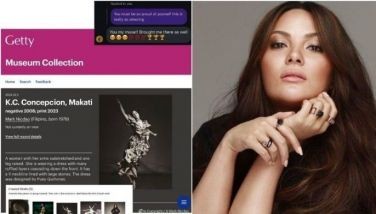Connie Francis: Among Her Souvenirs
America’s Sweetheart of Song declares: ‘If I were to live life all over again, I would change everything – everything!’
Find out why in this exclusive Conversation
There’s nothing left for me,
Of days that used to be.
There’s just a memory
Among my souvenirs
Contrary to what the first stanza of Among My Souvenirs, one of her all-time greatest hits, a thousand things are left of Connie Francis, America’s Sweetheart of Song whose golden voice dominated the airlanes in the ’60s and ’70s. Scan the library of a Baby Boomer and chances are that there’s a Connie Francis album/CD in it, neatly tucked among precious souvenirs.
Play a Connie Francis song, any song, and it brings you back to a yesteryear full of love and romance and of great expectations — Who’s Sorry Now, the song that catapulted her to stardom; My Heart Has a Mind of Its Own; Don’t Break the Heart That Loves You; Al Di La (theme song of the movie Lovers Must Learn, starring the late Troy Donahue and Suzanne Pleshette, remember?); Mama; My Happiness; Where The Boys Are; High Noon; Malaguena; My Happiness; Wishing It Was You, to name just a few.
These songs — and many others — will reverberate with fond memories on Valentine’s Day, Feb. 14, when Connie performs in The Connie Francis Greatest Hits Show, produced by Steve O’Neal.
Let’s do a little rewind:
Born Concetta Rosemarie Franconero, Connie made her debut at age 4 at Olympic Park in Irvington, New Jersey, singing Anchors Away. At age 11, she was a regular on a local TV show called Marie Moser’s Starlets, later becoming also a regular on Startime, a TV show that featured child performers.
Still in her teens, Connie signed a contract with MGM Records for which she did 18 unsuccessful records before hitting the jackpot with the song Who’s Sorry Now. Overnight, she was a sensation, earning, among other titles, America’s Sweetheart of Song, Japan’s Most Popular Singer, the World’s No. 1 Female Vocalist (by London’s prestigious New Musical Express), No. 1 in many other countries (Europe, USA, South America, Australia and the Far East), Italy’s Most Beloved Italian-American Singer, and a European’s Golden Lion awardee as Most Popular Artist-Male Or Female on the European Continent, along the way winning more titles and awards as she sold millions of records.
The rest is unprecedented history.
On Jan. 7, 1974, Connie’s life and career were turned upside-down when “something terrible” (read on) happened to her. Nearly a decade later, she bounced back, bruised but unbowed.
Conversations did an exclusive one-on-one with Connie by telephone a few days ago.
Hello, Connie?
“Ricky? Hi, how are you?” (Note: She was calling me by my nickname not because she knew me personally but because, I presumed, she must have been briefed by the contact person.)
I’m okay. Good evening. It’s 11 o’clock, Wednesday night, here in Manila.
“Oh, it’s 10 a.m., Wednesday, here in New York.”
I have a CD of your all-time hits in my library.
“Oh, thank you so much! You know, in America I’ve never met anybody from the Philippines that I didn’t like.”
Oh, yeah?
“That’s the truth. People working in hotels and nurses working in hospitals, I would always ask them, ‘You’re a Filipino, aren’t you?’
Filipinos are among the nicest people in the world.”
If I remember right, you were in Manila several years ago, weren’t you?
“No. I’ve never been in Manila. For many years, I wanted to perform in Manila but I have never been able to.”
Oh, what a pity!
“Last year, I was in Malaysia and Hong Kong. The only other places I visited in that area were Australia and New Zealand; I also went to Japan, but never to the Philippines.”
What have you been doing lately, aside from having concerts around the world? You haven’t stopped performing, have you?
“Well, for many years I was in the hospital. I was mentally ill. For nine years, I couldn’t work.”
Sorry to hear that. What happened?
“I was raped in Long Island (New York). It happened at the Howard Johnson Motor Lodge where I was staying during an engagement at then nearby Westbury Music Fair. That incident took nine years out of my life. It happened in 1974 and I didn’t sing again until Nov. 1981.”
Yes, of course, the incident was all over the headlines around the world. It must have been very traumatic for you.
“It was terrible! It was the most terrible period in my life! Without music in my life for nine years was just terrible. It was empty!
Now that I’m working, I’m having a wonderful time. I’m writing a new book, my autobiography, and it’s called Among My Souvenirs. I wrote one in 1984, titled Who’s Sorry Now. I’m producing a movie of my life and Gloria Estefan is going to portray me.”
When you look back at that unfortunate incident, what comes to your mind?
“Well, it’s the most dreadful experience any woman could go through, especially at knife point and you’re all alone. My life hung in the balance for two hours. I didn’t know whether I would live or die. You’re right: It was in the headlines all over the world. I didn’t want to go out; I just stayed in my house and not see anybody. For seven years, I didn’t do any interview, I didn’t make any personal appearance.”
How were you able to get back to normal life?
“Life was never normal since then, life has never been the same again. I missed my fans and I missed the applause and I missed the stage and I missed music so much. But I did get involved with (Pres.) Ronald Reagan’s task force on violent crime. I worked for the White House and I helped a lot of laws changed in the area of rape...and for all victims of violent crime, not just rape.”
What happened to your rapist?
“They never found him. He was a Black man with a mascara on his face and a knife in his hand. I was all alone in a hotel room. I couldn’t do anything because he had a knife in his hand. He wanted all my jewelry and my money. But I didn’t have any jewelry, I didn’t have any money, and he tried to kill me. And then I told him who I was and I said, ‘All I have is $100; I never carry more than that.’ And he said, ‘Do you think I would risk my life for $100?’ He pointed a knife at my neck and tied me up and put mattresses on top of me and threw himself on top of me. I was that way for two hours until the police came.”
And how did your family react to the incident?
“My parents were devastated. First of all, they were old-fashioned; they were strict Italian parents. And anything like that was, to them, a shameful thing. So, not only did they have to put up with my depression, they had to come to terms with the reality of it all.”
How did you get over that incident?
“As I told you...by going to the White House and getting involved with President Reagan’s men. I devoted all my time in the crusade against violent crime. And then, I worked 24 hours a day.”
What advice can you give to women all over the world?
“You know, there was a law in New York that said that if a woman didn’t put up a forcible fight with her attacker, she couldn’t even bring him to jail for prosecution. I went to the legislators and I said, ‘If I’d listened to your law, I would be dead now; I wouldn’t be standing here. A man is stronger, he has a weapon, how can a woman possibly fight him off?’ So I had that law changed; I had a lot of other laws changed.”
Okay, Connie. Let’s talk about music...your music. As America’s Sweetheart of Song, what’s your fondest memory?
“Well, that a poor girl could reach people all over the world with the voice that God gave me. At that time, I received more than 70,000 letters a week from around the world. This is the truth: At the height of my career, I received more letters from Indonesia and the Philippines than I did from the United States.”
You know, Connie, before this conversation, I replayed your CD and I picked out some songs. Can you recall what inspired you to do them and under what circumstances?
Who’s Sorry Now.
“I hated that song. My father was the one who wanted me to record that song. He loved music but he didn’t really know much about music. I had recorded nine songs for MGM and none of them was a success. I was down to my last record and my contract was about to expire. My father insisted that I record Who’s Sorry Now, a slow ballad first published in 1923. I told my dad, ‘It’s so square; the kids will laugh me right off the show.’ My dad said, ‘Look, if you don’t record this song, the only way you’ll ever get on American Bandstand (Dick Clark’s show) is if you sit on top of the television set.’ So, I recorded Who’s Sorry Now. Within a few months, it sold more than a million copies. And that song changed my life forever.”
My Happiness.
“It was a song that I liked as a little girl. Country music. I dreamed of recording that song ever since I was a little girl.”
Where The Boys Are.
“It was the title song for my first movie. My producer said, ‘Everybody in Hollywood was writing the title song for your first movie.’ I said, ‘No, no, no! I have to call my friends from Brooklyn to do a song for me.’ My producer said, ‘I’ve never heard of them.’ So I called up my friend Neil Sedaka and he said, I have one for you and it’s called Where The Boys Are.’ I said, ‘We can’t use that; it’s a stupid title.’ It was in the Top 10 even before the movie came out.”
Stupid Cupid.
“That was also written by Neil Sedaka for his first album. He was 18 and he came to my house...and, wait for it, I will tell the whole story during my show in Manila.”
High Noon.
“It was not a single in the United States, it was included in my album called Never On Sunday. I sang High Noon and it was a big success not in America but in other countries. Yes, I’m gonna sing that in my show in Manila.”
Follow The Boys.
“It was a beautiful song from a terrible movie...my second movie. It was my worst movie.”
Wishing It Was You.
“I think Manila was the only place where that song was a success. I hardly even remember it. When people said, ‘Wishing It Was You,’ I would answer, ‘Wishing it was...what?’ And they would say, ‘It’s a song; you recorded it.’ So I looked for the arrangement, I didn’t have it...and, well, I’ll tell you more about that song during my show in Manila.”
So what else can we expect from your show in Manila?
“Let me ask you something first...Was Spanish Eyes a big hit in Manila?”
Yeah, it was. Almost all of your songs were big hits in the Philippines.
“I will sing as many of my hits as I can do...Spanish songs, Italian songs, English songs and all the other songs that you mentioned. Whatever the people there want to hear.”
Among your songs, what’s your favorite...the one closest to your heart?
“Mama. Yes, of course, Mama! Why? Because that’s the song that touched the most number of people all over the world.”
If you were to live life all over again, would you change anything?
“I would change everything. Ha, ha, ha, ha, ha, ha! Why? Because I have lots of regrets. My four marriages were mistakes.”
Four marriages...and how many children?
“Oh, just one. Only one child.”
So what happened to your marriages?
“One lasted four months, one lasted 10 months, one lasted 81 days and one lasted seven years. So I’m not a big fan of marriage. That’s my biggest regret — that I got married.”
Oh, you’re not the marrying kind.
“No, not me!”
A few more tokens rest
Within my treasure chest.
And though they do their best
To give me consolation.
I count them all apart
And as the teardrops start,
I find a broken heart
Among my souvenirs.
(Note: Tickets to The Connie Francis Greatest Hits Show at the Araneta Coliseum on Feb. 14 are now on sale. For inquiries, call Ticketnet at 911-5555. Or check any SM Mall ticketron.)
(E-mail reactions at [email protected]
or at [email protected])
- Latest
- Trending

























 Exclusive
Exclusive





